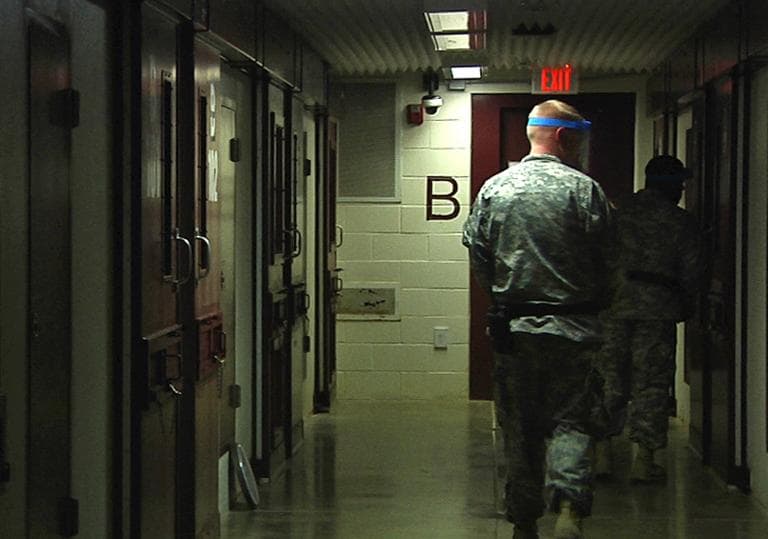Advertisement
Lawyer Calls For Pragmatic Approach At Guantánamo Bay
Resume
The hunger strike at the Guantánamo Bay prison is still ongoing — the Department of Defense reports that 100 of 166 men being held are participating. And of those, 23 are being force-fed a nutritional supplement through nasal tubes.
David Remes is a human rights attorney who represents 16 clients at Guantánamo and he has just returned from a trip there. He says the commander in charge of the detention center, Col. John Bogden, should resolve the disagreement by sitting down with striking detainees.
"All they wanted was to have the military stop searching their Qurans," he told Here & Now's Robin Young. "The hunger strike could have been over in four days."
More than half of the men at Guantánamo have been cleared for release, but some of those being held have been charged with serious crimes.
President Obama has renewed his efforts to close the Cuba prison, but Representative Buck McKeon, (R-CA), chairman of the House Armed Services Committee, writes in USA Today that while he understands the situation is complex, the detainees there are dangerous. "They do mean us harm. And until a better solution is offered, at Guantánamo they must stay," he writes.
Interview Highlights

On the condition of the detainees
I saw men who had lost 40-60 lbs. The ones who are not being force-fed are very weak, find it difficult to focus and speak, although they do come to clarity after a while. The ones who are being force fed are rather energetic and focused because they're being force fed.
On determining who to force feed
The determination of being force fed naso-gastrically comes when the military considers the men close to death. It plays a kind of reckless game of chicken. It doesn't intervene just because a man is on a hunger strike. The man has to be losing consciousness and really nearly be at death's door. That's one of the ways the military uses to deter hunger striking.
International law requires the military to respect a man's desire to hunger strike, even to death. The policy at Gitmo is to keep men alive by any means possible.
On the ethics of force feeding
I think that it violates international law and men should be respected in their choice to hunger strike even to death as Bobby Sands of the IRA did decades ago. The British didn't intervene, he died, he became a martyr, and some say that the military is keeping the Guantánamo detainees alive because they don't want to make "heroes of zeroes" as the expression goes.
[Note: Margaret Thatcher, who was PM during the Sands hunger strike, was excoriated for not intervening.]
On what the detainees want
Years ago when there were hunger strikes over Quran issues, the commander at the time sat down and worked things out. There was discussion. There was flexibility. This commander [Col. John Bogden] however is not going to talk to the detainees at all until they break their hunger strike. As a result, we're now in the fourth month of the hunger strike. The command has to bring down 40 reinforcements of medics. I'd say the most important thing right now is for the command to talk to the detainees unconditionally and try to figure out a way to solve the problem
...Everything was peaceful and quiet before he assumed command in June... but when a commander came in who decided to rule with an iron fist, all hell broke loose.
On whether people who go on hunger strikes are taking themselves hostage and therefore should not be brought into negotiation because then every prisoner would stop eating.
Detainees have gone on hunger strikes before and the hunger strikes have been resolved because the command has been pragmatic. We're now into the fourth month of a hunger strike and the demand has expanded beyond stopping the searches of the Quran to being released from Guantánamo.
Guest:
- Attorney David Remes
This segment aired on May 8, 2013.